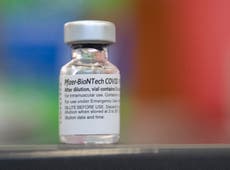Brussels boss suggests UK cut corners on Covid vaccine approval
Europe chose not to ‘compromise safety and efficacy requirements’, says Ursula von der Leyen

Your support helps us to tell the story
From reproductive rights to climate change to Big Tech, The Independent is on the ground when the story is developing. Whether it's investigating the financials of Elon Musk's pro-Trump PAC or producing our latest documentary, 'The A Word', which shines a light on the American women fighting for reproductive rights, we know how important it is to parse out the facts from the messaging.
At such a critical moment in US history, we need reporters on the ground. Your donation allows us to keep sending journalists to speak to both sides of the story.
The Independent is trusted by Americans across the entire political spectrum. And unlike many other quality news outlets, we choose not to lock Americans out of our reporting and analysis with paywalls. We believe quality journalism should be available to everyone, paid for by those who can afford it.
Your support makes all the difference.European Commission president Ursula von der Leyen has suggested that the UK won a head start in its Covid-19 vaccination programme by compromising on “safety and efficacy”.
Her comments came as French health minister Clement Beaune claimed the UK was “taking many risks” with its vaccination campaign, which has got first doses to some 9.3m people in just over a month – almost one in seven of the entire population.
Both Ms von der Leyen and French president Emmanuel Macron are coming under intense pressure over the relatively slow progress of programmes on the continent, where little more than 2 per cent of the population have so far received protection.
Speaking to French newspaper Le Monde, the commission president defended the EU’s decision to authorise potential vaccines centrally through the European Medicines Agency.
While the UK’s Medicines and Healthcare products Regulatory Agency (MHRA) was able to give the green light to vaccines from Pfizer/BioNTech on 2 December and Oxford/AstraZeneca on 30 December through temporary emergency approval of specific batches, the EMA was barred from taking this fast-track approach.
Its approval for the Pfizer jab did not come until 21 December and AstraZeneca did not get clearance for use in the 27 member states until last Friday.
Asked about the UK’s ability to move more quickly, Ms von der Leyen told Le Monde: “Some countries started to vaccinate a little before Europe, it is true. But they resorted to emergency, 24-hour marketing authorisation procedures.
“The commission and the member states agreed not to compromise with the safety and efficacy requirements linked to the authorisation of a vaccine. Time had to be taken to analyse the data, which, even minimised, takes three to four weeks.
“So, yes, Europe left it later, but it was the right decision. I remind you that a vaccine is the injection of an active biological substance into a healthy body. We are talking about mass vaccination here; it is a gigantic responsibility.”
Her comments came after Mr Beaune said on Monday: “The British are in an extremely difficult health situation. They are taking many risks in this vaccination campaign. And I can understand it, but they are taking many risks.”
Ms von der Leyen’s predecessor, Jean-Claude Juncker, went public on Monday with criticisms of Brussels’ handling of vaccine procurement and approval.
"I believe it all went too slow, it hasn't all been done with the maximum transparency, even though that would have been a difficult task," Mr Juncker told a virtual event in Germany.
He was also critical of the commission’s attempts last week to prevent the export of vaccines out of the EU.
"At the beginning of the pandemic crisis, some countries made the incomprehensible decision to not export medical material,” said Mr Juncker. “This was corrected by the European Commission. Now we are back in a debate where again the suggestion is being made that nothing should be exported from the European Union to other non-EU countries.
"We are ... not just responsible for ourselves. This is a pandemic that affects everyone on this planet. I am very much opposed to the European Union now giving the impression that we are taking care of ourselves and that the suffering of other people, especially in poorer countries and on poorer continents, does not affect us.”
Prime minister Boris Johnson’s official spokesperson rejected suggestions that the UK had compromised safety or taken risks with vaccines.
He pointed to the assessments announced by MHRA chief executive DrJune Raine in the case of the approvals granted to each of the Pfizer, AstraZeneca and Moderna vaccines.
“June Raine … was very clear that no corners were cut and no stones were left unturned, and that their recommendation was based on an extremely thorough evaluation of all the data from the clinical trials,” said the PM’s spokesperson.
“The PM’s view is that the public should remain confident in the safety and effectiveness of the vaccinations.
"As he said yesterday, if people are asked to come forward to take the vaccine, they should do so confident in the knowledge that they are both safe and effective.”




Join our commenting forum
Join thought-provoking conversations, follow other Independent readers and see their replies
Comments